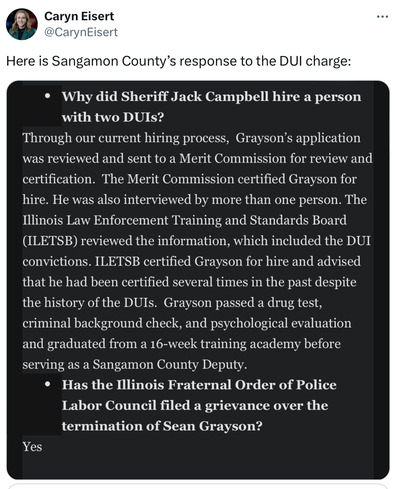|
Reader comments closed for the weekend
Friday, Jul 26, 2024 - Posted by Rich Miller * Talk with you Monday…
|
|
Protected: SUBSCRIBERS ONLY - Campaign stuff
Friday, Jul 26, 2024 - Posted by Rich Miller
|
|
Isabel’s afternoon roundup
Friday, Jul 26, 2024 - Posted by Isabel Miller * Illinois Environmental Protection Agency…
Click here for a complete list of the communities receiving principal forgiveness funding. * Governor Pritzker…
* Brownfield AG | Illinois farmers own 24% of the land they farm: A new study from Illinois Farm Business Farm Management (FBFM) shows the state’s farmers only owned 24% of the land they farmed in 2021. Brad Zwilling, vice president of data analysis at FBFM, says it’s not a new trend. “Crop share was at 27% and cash rent at 48%,” he says. “That trend has continued to increase on the cash rented side and lower on the crop shared side primarily due to more and more absentee landlords or just wanting to not have to worry about marketing grain.” * Tribune | Climate bill rebates for electric appliances and upgrades coming to Illinois in 2025: They are some of the juiciest consumer incentives in President Joe Biden’s 2022 climate bill: rebates of up to $8,000 for a heat-pump air conditioner and heater, up to $4,000 for an electrical panel, up to $2,500 for electrical wiring, and up to $1,750 for an electric heat pump water heater. And they’re coming to Illinois. The state plans to roll out its home energy rebates in the first quarter of 2025, the Illinois Environmental Protection Agency said in a written response to questions from the Tribune. * My Journal Courier | State spreading awareness of Firearm Restraining Orders: The Illinois Department of Public Health, Brady: United Against Gun Violence and the Ad Council have released a public service announcement video advocating an end to gun violence. The agencies are promoting “Pause to Heal,” a multi-state campaign to bring awareness to Firearm Restraining Orders, or “red flag laws” designed to help prevent firearms from falling into the wrong hands. * Crain’s | How the quantum and United Center projects could spark action in investment-starved neighborhoods: The quantum and United Center projects — which have their own anchor users lined up, unlike other planned megadevelopments in the city — set the stage for more real estate investors to follow into neighborhoods they don’t frequent. But the proposals also put pressure on city officials to ensure they are properly leveraged as a launching pad. “They shouldn’t just be seen as little dots on the map, and that’s the only planning that happens,” said city planning department veteran Eleanor Gorski, who is now CEO of the Chicago Architecture Center. “These are dots with ripples, and the city needs to step up and produce the ripples.” * WTTW | Gage Park Man Who Spent 21 Years in Prison Now the 45th Person to be Exonerated After Being Framed by Disgraced Ex-Detective: Edwin Ortiz, who is now 51 and lives in Gage Park, was 14 years old when Jose Morales was shot to death in Humboldt Park alongside his friend Marvin Taylor, who was wounded. Ortiz was convicted in connection with the shooting in 1993 after being investigated by Reynaldo Guevara, a former Chicago police detective accused of routinely framing suspects. The Cook County State’s Attorney’s Office did not oppose Ortiz’ request to have his more than 30-year-old conviction vacated. * Tribune | Three charged with murder, arson and financial crimes in connection with death of Chicago firefighter: Martez Cristler, 22, of Hammond, Indiana, and Nicholas Virgil, 37, of Riverdale, are charged with murder and arson. Anthony Moore, 47, of Blue Island, is charged with wire fraud, insurance fraud and forgery. […] Moore’s arrest report lists State Farm Insurance as the victim in the incident. A Tribune reporter spoke with Moore last year shortly after the fire, and he said he was in the process of rehabbing the property as a rental unit. * WTTW | Is There an Alligator in Lincoln Park’s North Pond? Witnesses Say Creature They’ve Dubbed ‘Muddy Waters’ Is Lurking But Confirmation Scarce: Tom Hildum knows people aren’t going to believe him. But the Auburn resident swears he’s seen an alligator in Lincoln Park’s North Pond. Not once, but twice. “I was skeptical too,” said Sheba Heard, Hildum’s wife of 16 years. Then she got a look at the creature herself, “tip to tail, skimming across the top of the water.” * Sun-Times | Suburban Chicago lab lied to Medicare, billed millions of dollars for COVID-19 tests on dead people, federal probe finds: Abdul Wahed’s company, Pro Diagnostics in Bridgeview, is suspected of using a suburban doctor’s credentials without her knowledge to approve the tests, according to court papers filed in the federal investigation. Tens of thousands of Medicare claims for tests in Illinois and other states showed the same doctor ordered them, which aroused suspicions, according to the court filing. Pro Diagnostics billed Medicare for 48,552 claims on Dec. 6 and for another 35,585 claims the next day, according to the affidavit, which says law enforcement officials were alerted because of the “extraordinary spike in billing.” * WSIL | Kristin Bayer Selected as New Williamson County Circuit Clerk Republican Nominee: Bayer was selected the nominee after Justin Maze resigned the Williamson County Circuit Clerk seat earlier this year. Bayer will be running unopposed on the November ballot. “I am excited for this opportunity and looking forward to serving the people of Williamson County,” said Kristen as she spoke to several supporters at the Administration Building Thursday afternoon. * WPSD | Boys and Girls Clubs of Southern Illinois reach fundraising goal to reopen: BGCSI’s reopening campaign sought a goal of $200,000 to relaunch the clubs after closing last summer. The organization is aiming to open up around the time that school starts, but that step hinges on the hiring of a new CEO and staff. * WSIL | Herrin Animal Control deemed “no kill” shelter: The center posted to Facebook on Friday morning to announce it received a “No-Kill Status” from the Best Friends Network. This recognition goes toward shelters that manage a 90% save rate for the animals. “We are extremely happy to have received this prestigious accomplishment helping the City Of Herrin animals get a second chance on life,” wrote the center. “We cannot possibly save them all, but we can save most.” * WCIA | Daughters of Central IL Olympian celebrating his legacy 100 years later: he 2024 Olympic Games in Paris kick off Friday. The last time the “City of Love” played host was a century ago when an athlete from Central Illinois went for gold— twice. Now, the University of Illinois is celebrating Harold Osborn’s life and legacy ahead of the games. The university welcomed back two of Harold Osborn’s daughters to give a webinar about their father Thursday morning. They said he is a reminder that humble beginnings can lead to global success. * WGEM | Illinois Treasurer Frerichs shows off unclaimed property ahead of State Fair auction: Items include a Rolex Oyster watch, Mike Singletary and Troy Aikman football cards, uncut sheets of money and many rare coins and other collectables. Illinois State Treasurer Michael Frerichs holds the auction each year at the fair. His office auctions off unclaimed property, including items left in abandoned safety deposit boxes, if they go unclaimed for at least 10 years. All proceeds are held by the Treasurer’s Office and paid to the property’s owner or their heirs if they are located. * The Grio | The ‘Kamala ain’t Black’ conspiracy theory explained: While it is easy to dismiss this claim by using the age-old method of genetic testing called “eyesight,” theGrio decided to investigate this hilarious hypothesis seriously. […] To effectively debunk this allegation, we must first agree on what people are saying. While there are numerous stories and tweets claiming Harris descended from a white slaveowner, those stories just prove people’s ignorance of America’s true history. Slavemasters often raped their human property, which explains an American Journal of Human Genetics study showing the average African American’s genome is nearly a quarter European. Loving vs. Virginia didn’t cause that; the sexual violence of racial terrorism did. As one teenager wrote: “It is fair to remember that almost the total of race mixture in America has come, not at Negro initiative, but by the acts of those very white men who talk loudest of race purity.” * Sun-Times | ‘Illinoise’ superfans are seeing the Broadway show over and over: If theatergoing were an Olympic sport, then Matthew Dodson would be Michael Phelps. This year alone, the Manhattanite has already attended 160 performances on and off Broadway. In the past, thanks to rush and lottery ticket options, as well as last-minute deals on SeatGeek, he’s racked up head-spinning numbers for shows like “Company” (50 times), “Shucked” (60 times) and “The Phantom of the Opera” (100-plus visits). * KFVS | Boar’s Head recalls more than 207,000 pounds of deli products over possible listeria contamination: The nationwide recall of about 207,528 pounds of products was announced by the U.S. Department of Agriculture’s Food Safety and Inspection Service on Friday and includes several varieties of its deli products that were produced on the same day as the liverwurst. The ready-to-eat liverwurst products were produced between June 11 and July 17 and have a 44-day shelf life.
|
|
FOP Labor Council wants indicted murderer reinstated to job with back pay (Updated)
Friday, Jul 26, 2024 - Posted by Isabel Miller * Nexstar Illinois Capitol Bureau Chief…
…Adding… The grievance was filed by the FOP Labor Council, not, as posted in that tweet, the ILFOP. * They’re calling for Grayson’s full reinstatement and back pay…
That Facebook post is here. * Sonya Massey’s autopsy was released today. A.P.…
* WAND reporter…
* Invisible Institute and Investigative Reporting Workshop…
* Sangamon County’s response… * SJ-R…
…Adding… WCIA…
|
|
If wishes were fishes…
Friday, Jul 26, 2024 - Posted by Rich Miller * The Tribune on the new CPS budget…
The “easy route” is pretending that the state and federal governments are gonna bail out the CPS budget this fiscal year, which started on July 1, by the way. * WBEZ…
|
|
Meanwhile… In Ohio
Friday, Jul 26, 2024 - Posted by Isabel Miller * A.P.…
* Justice Michael P. Donnelly wrote in dissent…
* Ohio Dems response…
* Ohio State Rep. Elliot Forhan emailed colleagues with this co-sponsor request this morning…
Thoughts?
|
|
Open thread
Friday, Jul 26, 2024 - Posted by Isabel Miller * What’s going on in your part of Illinois?
|
|
Isabel’s morning briefing
Friday, Jul 26, 2024 - Posted by Isabel Miller * ICYMI: Pritzker downplays VP talk, denies call with Harris campaign. Sun-Times…
- The Sun-Times stands by its story. - Asked directly about the call, Pritzker responded, “I don’t want to talk about any private conversations that I’ve had, but I will say that I have said directly to the vice president that I’m going to do everything and anything that is necessary to make sure that we beat Donald Trump and JD Vance.” * Lincoln Presidential Library…
* WBEZ | As the DNC returns to Chicago, Illinois’ dean of the delegation, Dick Durbin, basks in the moment.: There is no shortage of Democrats parsing Durbin’s every move, trying to suss out if this term might be it for the No. 2-ranking Democrat in the U.S. Senate. He has this advice for those already quietly jockeying for his job in 2026: Cool your heels. “I’ll make up my mind and decide whether I’m going forward or not after the first of the year, and people on the bench then have to make decisions accordingly,” Durbin told WBEZ from his Chicago office overlooking the Loop and Lake Michigan. * AP | Chicago police chief says out-of-town police won’t be posted in city neighborhoods during DNC: As many as 500 officers, mostly from Illinois agencies, will travel to Chicago to boost DNC security. They’ll be directing traffic and working at the numerous checkpoints around the convention sites of the United Center and McCormick Place. “This will free up our officers, our Chicago police officers, to be in more volatile areas,” Snelling said at a news conference with the U.S. Secret Service, FBI, Gov. J.B. Pritzker and city leaders. “We can’t have a successful Democratic National Convention, if we’re not protecting the entire city as a whole.” * Crain’s | Pritzker touts Illinois’ cannabis social equity program: Poised to be ‘national standard’: Pritzker said that the study, which was authored by the Illinois Cannabis Regulation Oversight Office, reported that Maryland had the second most diverse cannabis industry, with 37% of business permits held by minority or women owners, followed by New Jersey with 36%, Colorado with 34%, Michigan with 25%, and Massachusetts with 24%. * Play USA | FanDuel Pleads With Legislators To Keep Online Gaming Tax Rates Reasonable: This year, Illinois lawmakers increased a 15% online sports betting tax rate to as high as 40% at a graduated rate. Brandt Iden, vice president of government affairs at Fanatics, said despite threats made to leave the Illinois market if the tax rate increased, operators are going to stick it out. “Illinois wasn’t quite as bad as New York, but Illinois has been bad from a sports betting perspective,” Iden said. “I mean, they raised the tax rates overnight, a very difficult progressive tax rate structure, and it doesn’t make sense. * Tribune | Chicago Board of Education passes $9.9B budget, withstanding pressure from Mayor Brandon Johnson and teachers union: While the vote may have settled the debate over addressing CPS’ $505 million deficit, the plan doesn’t account for future collective bargaining costs resulting from ongoing negotiations, with the approximately 30,000-member Chicago Teachers Union and the Chicago Principal Administrators Association of over 1,200 members. * CBS Chicago | Businesses concerned about effect of Chicago DNC security restrictions: Brent Bashier owns Doc’s Smokehouse in Milwaukee and said he did not expect to be surrounded by fencing during the Republican National Convention there earlier this month. The feds’ map for the RNC showed Doc’s right by the hard perimeter but technically in the pedestrians-allowed zone. “We didn’t know that our side street would also be fully restricted. What was not depicted in any of the maps was that there was only one way to get to us,” Bashier said. * Sun-Times | Judge rejects motion to dismiss weapons, misconduct charges against former 45th Ward superintendent: A Cook County judge on Thursday rejected a motion to dismiss weapons and misconduct charges against a former 45th Ward superintendent who allegedly tried to sell a World War II- era machine gun to an undercover federal agent while working a city job. […] Defense attorney Jim McKay, his voice rising to an impassioned shout, told Judge Kenneth Wadas that if the court allowed the case against Charles Sikanich to continue, authorities might as well start charging veterans at VFW halls too. “What about all of the cannons out in front of every VFW hall in the United States?” McKay asked. “If that’s the case, then everyone at that VFW hall should be charged too. This is insane.” * Tribune | Cook County judge unlawfully banned exoneree turned law clerk from courthouse over a phone, lawyers allege: a motion alleges, Judge Peggy Chiampas “began screaming loudly from the bench ‘bring him in, bring him in, bring him in.’” After questioning him in chambers, Chiampas wrote an order that banned Robert Almodovar, who was issued a certificate of innocence in 2018, from the Leighton Criminal Court Building, an unusual move in a public building with a mandate for transparent court proceedings. Now, Almodovar, through his attorney, is contesting the ban and asking that a judge other than Chiampas hear the matter, which has spurred a bizarre, monthslong process in which the matter has been tossed around to multiple judges who seem reluctant to touch the issue and roped in assistant state’s attorneys, even though there are no criminal or contempt of court charges. * Capitol News Illinois | In the suburbs, proposed water rates spark outrage from residents, advocates: At Monday’s hearing, area residents lodged often passionate complaints, with all but one speaker opposing the request. Pat Smith, a nearby resident, said her family installed new insulation and upgraded windows to reduce energy costs, but struggled to reduce its water bill. […] Cindy Zacharias, a registered nurse from Bolingbrook, noted the number of people, particularly older people on fixed incomes, who spoke before her and described struggling to pay their water bills. * Tribune | Longtime OPRFHS history teacher departs the school citing ‘the continued toll of antisemitism’ there: In the letter, a copy of which Pioneer Press obtained through a public records request, Soffer, also a 2003 graduate of the school, said the last few years at OPRFHS have been “incredibly trying”. He said that antisemitism at the school – which enrolls students from the neighboring towns of Oak Park and River Forest – and the district’s lack of response to it, created “an untenable climate” for him. * Daily Herald | The DuPage County Fair is back with a full-scale carnival, sheepherding dogs and loads of ice cream: Along with the county fair staples, the Mama Coco Mobile Cuisine food truck has al pastor and steak tacos with fresh chopped cilantro and onion. Nearby, The Roasted Cob stand serves whole corn cobs with the charred husks still attached. Gyro meals spill over the plate. And on the sweeter side of things, a pie-eating contest is set for Friday afternoon on the west lawn. * Daily Herald | Going for Gold: Here are the suburban athletes on Team USA competing in Paris: Twelve athletes who attended suburban high schools will compete for Team USA at the 2024 Paris Olympic Games, which kicks off Friday, July 26 and runs through Aug. 11. […] Korbin Albert, Grayslake, Classical Consortium Academy, women’s soccer A midfielder for Paris Saint-Germain in 2023, Albert is making her Olympic debut. The U.S. women began group play Thursday with a 3-0 win over Zambia. * Herald-Review | Former Decatur council candidate sues mayor, city: In a Monday court filing, Marty Watkins, a U.S. Army veteran and a chaplain at the Macon County Sheriff’s Department, alleged that both former City Manager Scot Wrighton and Public Works Director Matt Newall “gave the directive” for the removal of his campaign signs in March 2021 while other candidates’ signs, also allegedly in unauthorized areas, were untouched. Watkins also alleges that Mayor Julie Moore Wolfe was “informed” about the signs being removed. […] Watkins is seeking $400,000 in damages to compensate for emotional harm, pain and suffering and loss of enjoyment of life. Reached by Herald & Review Thursday afternoon, Watkins said his “claim basically speaks for itself.” * SJ-R | Accusations of sexual abuse of a minor leveled against former Springfield Catholic bishop: A former Springfield Roman Catholic bishop has been accused of sexually abusing a minor according to one of several lawsuits brought against the St. Louis archdiocese and current Archbishop Mitchell T. Rozanski this week. Archbishop George Lucas, who served in Springfield from 1999 to 2009, was a priest and the dean of education at the St. Louis Preparatory Seminary School in the late 1980s when the alleged abuse occurred. * WCIA | Deja vu? Canadian wildfire affects being felt in Central Illinois: Canadian wildfires are burning thousands of miles away, but the affects are starting to be felt here in Central Illinois. Air quality is getting worse from the smoke, and some people may want to be careful over the next few days. * The Telegraph | The secret deal that plunged Rupert Murdoch into a family war: Although Succession has ended, the real-life battle for the Murdoch empire rages on: a decades-long tale of power, money, and internecine family rivalry that would make the Ancient Greeks blush. This week it has been revealed that Rupert Murdoch is embroiled in a secret legal battle with three of his children over the future of the business. At 93, it seems the old tycoon has lost none of his appetite for a fight, nor his willingness to line up with one of his children against the others. * BOLTS | For Thousands of Georgians, Freely Traveling Across State Lines for an Abortion Is Not an Option: The near-total ban will severely constrict the reproductive choices of Georgians on probation and parole. Residents in this category who need an abortion will be faced with an impossible choice: giving birth and caring for a baby they do not want and likely cannot afford to raise, or traveling out of state for an abortion and risking a violation of their parole or probation conditions, which could land them back in prison.
|
|
Protected: SUBSCRIBERS ONLY - Today’s edition of Capitol Fax (use all CAPS in password)
Friday, Jul 26, 2024 - Posted by Rich Miller
|
|
Live coverage
Friday, Jul 26, 2024 - Posted by Isabel Miller * You can click here or here to follow breaking news. It’s the best we can do unless or until Twitter gets its act together.
|
|
Selected press releases (Live updates)
Friday, Jul 26, 2024 - Posted by Isabel Miller
|
| « NEWER POSTS | PREVIOUS POSTS » |
















